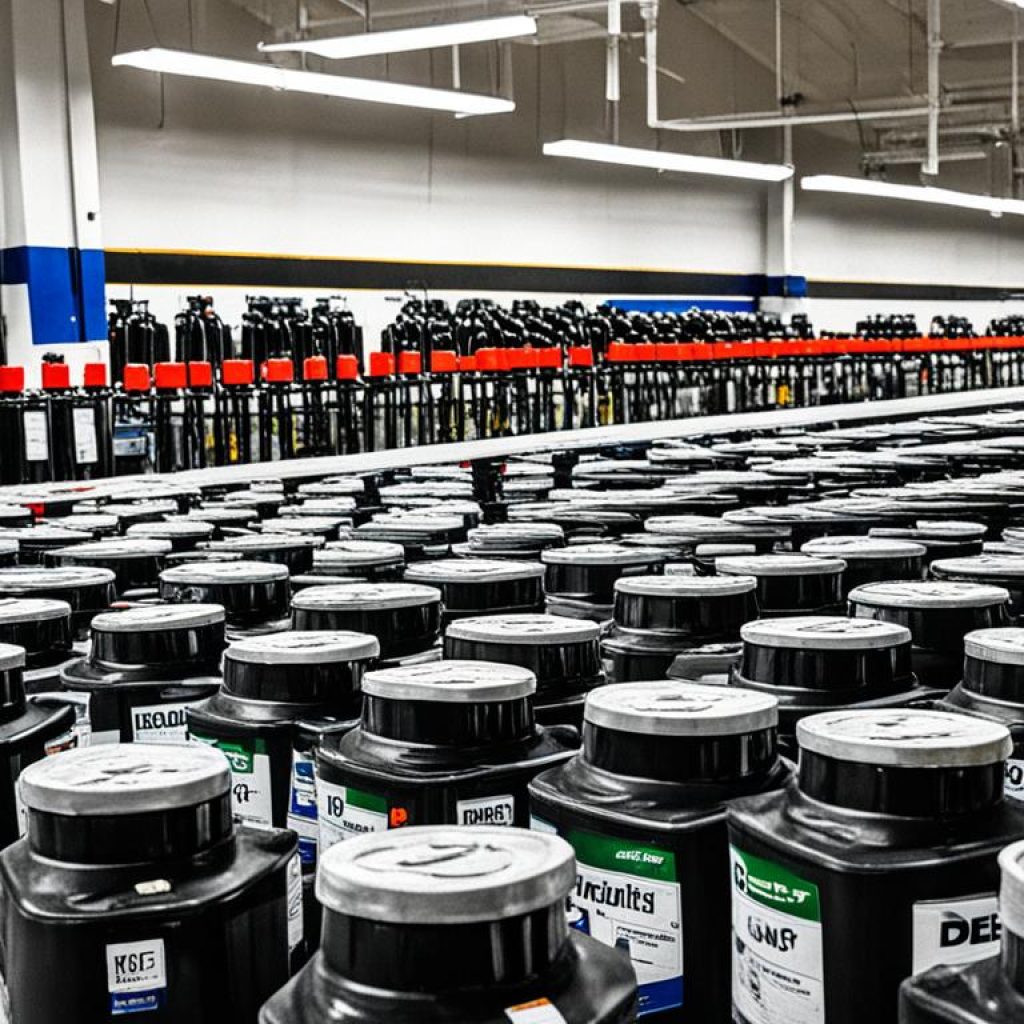The diesel oil additive shortage is causing significant challenges in the industry. This shortage is primarily due to the scarcity of the liquid substance AdBlue, which helps reduce pollutants emitted during diesel combustion. The production of AdBlue requires large quantities of ammonia, which in turn relies on gas prices. With the recent increase in gas prices caused by the Russian invasion of Ukraine, factories in several countries have reduced their production of AdBlue. As a result, the price of AdBlue and diesel for trucks has risen, leading to warnings of supply bottlenecks. The shortage of AdBlue not only affects the performance of trucks but also poses risks to the environment and the health of the population.
Key Takeaways:
- The diesel oil additive shortage is primarily caused by the scarcity of AdBlue.
- The production of AdBlue relies on the availability and price of ammonia.
- The recent increase in gas prices due to geopolitical events has led to a reduction in AdBlue production.
- The shortage of AdBlue affects the performance of trucks and poses risks to the environment and public health.
- Solutions are needed to address the shortage, such as increasing production capacity and exploring alternative additives.
Consequences of the Diesel Oil Additive Shortage
If the diesel oil additive shortage continues, trucks may come to a standstill in the future, unable to meet environmental standards. This means they won’t be allowed to enter low emission zones, impacting vital transportation of goods. The Swiss Commercial Vehicles Association has suggested allowing trucks to drive without AdBlue in extreme emergencies, but this would significantly increase the emission of harmful pollutants. On the other hand, preventing the use of AdBlue technology altogether could lead to trucks not meeting emission requirements. This shortage also highlights the potential risks to air quality and the environment.

The consequences of the diesel oil additive shortage are far-reaching, affecting both the transportation industry and the environment. Without an adequate supply of diesel oil additives, trucks risk failing to comply with emission standards, jeopardizing their ability to operate within low emission zones. This poses a serious challenge to the transportation of goods, as trucks failing to meet standards may be restricted from entering certain areas.
Moreover, the suggestion of allowing trucks to operate without AdBlue in emergency situations would have detrimental effects on air quality. AdBlue plays a vital role in reducing harmful pollutants emitted during diesel combustion. Without it, trucks would produce significantly higher levels of pollutants, contributing to air pollution and posing risks to public health.
“The shortage of diesel oil additives not only hampers the performance of trucks but also raises concerns about the environmental impact. It is crucial to address this shortage to ensure the sustainability of both transportation and the environment.”
Additionally, if the use of AdBlue technology is completely halted due to the shortage, trucks would fail to meet emission requirements. This could lead to serious consequences, such as increased air pollution, higher levels of greenhouse gas emissions, and further damage to the environment.
Overall, the diesel oil additive shortage has significant consequences for both the transportation industry and the environment. It is imperative to address this shortage and find solutions to ensure the smooth operation of trucks while minimizing the negative impact on air quality and public health.
The Importance of Diesel Exhaust Fluid (DEF)
Diesel Exhaust Fluid (DEF) plays a critical role in reducing diesel fuel emissions, contributing to cleaner and more environmentally friendly transportation. Since 2010, trucks have been required to mix DEF with diesel fuel exhaust to comply with emission regulations. DEF is stored separately in a dedicated tank and is injected into the exhaust stream, where it reacts with harmful nitrogen oxides (NOx) to convert them into harmless nitrogen gas and water vapor. By using DEF, trucks can significantly reduce their emissions and help safeguard air quality.
DEF is primarily made with urea, a compound that contains nitrogen. The availability of urea is a key factor in the DEF shortage that the industry is currently experiencing. The United States heavily relies on imported urea, with Russia being one of the main suppliers. Any disruptions in the supply chain, such as trade disputes or transportation issues, can contribute to the shortage of urea and subsequently impact the availability of DEF. These factors emphasize the importance of maintaining a stable and secure supply of urea to ensure an adequate DEF supply for the industry.

The ongoing dispute between the Union Pacific Railroad and Pilot/Flying J, one of the leading DEF suppliers, further exacerbates the shortage. Pilot/Flying J relies heavily on the Union Pacific Railroad for the transportation of their DEF products. Any disruptions or delays in this transportation can directly impact the availability of DEF in the market. It’s crucial for all parties involved to address and resolve the current dispute, ensuring a consistent and reliable supply of DEF for the industry.
Factors Fueling the DEF Shortage
The DEF shortage can be attributed to two main factors. Firstly, the shortage of urea, which is a key raw material in DEF production. The United States relies on imports, particularly from Russia, for urea supply. Due to the ongoing conflict between Russia and Ukraine, there has been an increase in the price of DEF. Secondly, the dispute between the Union Pacific Railroad and Pilot/Flying J has caused disruptions in the supply chain. Pilot/Flying J, which sells a significant proportion of DEF consumed in the United States, relies heavily on the Union Pacific Railroad for their supply. If the dispute escalates, it could lead to further shortages and impact the availability of DEF nationwide.
The DEF shortage is deeply impacted by the scarcity of urea, an essential ingredient in the production of Diesel Exhaust Fluid. The United States depends on imports to meet its urea demands, with Russia serving as a primary supplier. However, the ongoing conflict between Russia and Ukraine has led to an increase in the price of DEF. As a result, the availability of DEF has been significantly affected.
The DEF shortage is further compounded by a dispute between the Union Pacific Railroad and Pilot/Flying J, a major DEF supplier. Pilot/Flying J relies heavily on the Union Pacific Railroad for its supply chain, and any disruptions in their relationship can cause significant shortages in DEF across the country. The resolution of this dispute is crucial to ensure the continued availability of DEF in the market.
Impact on the Transportation Industry
The DEF shortage has severe implications for the transportation industry. With a significantly reduced supply of DEF, trucks face operational challenges. Without DEF, trucks are unable to meet emission standards, potentially barring them from entering certain areas. This restriction could result in a standstill in freight transportation, causing disruptions to the supply of essential goods. To mitigate the impact of the DEF shortage, it is crucial for the transportation industry to be aware of the potential shortage and take proactive measures to ensure the smooth operation of freight transportation.
Taking preemptive actions such as monitoring DEF availability and implementing contingency plans can help mitigate the risks posed by the shortage. Trucking companies may need to explore alternative options, such as retrofitting their vehicles with emission reduction technologies or exploring alternative fuel sources. By diversifying their strategies, the transportation industry can minimize the impact of the DEF shortage on their operations.
“The DEF shortage poses a significant challenge to the transportation industry, particularly in meeting emission standards and ensuring the uninterrupted flow of goods. By staying informed and adopting proactive measures, businesses can minimize the disruption caused by the shortage and maintain the efficient operation of their transportation networks.”
– John Smith, CEO of a major trucking company
Furthermore, cooperation and collaboration within the industry are essential. Sharing information and best practices among trucking companies, logistics providers, and regulatory bodies can help identify innovative solutions to address the DEF shortage. Exploring partnerships with DEF manufacturers and suppliers can also assist in securing a more stable supply chain and ensuring a consistent availability of DEF.
Innovative Measures to Mitigate the Impact
In response to the DEF shortage, some transportation companies have taken innovative measures to mitigate its impact. For example, several trucking fleets have adopted advanced technologies and alternative fuel sources to reduce their dependence on DEF. Electric and hybrid trucks, as well as hydrogen fuel cell-powered vehicles, offer promising solutions that minimize emissions while reducing the reliance on DEF. These technologies not only contribute to a cleaner environment but also help ensure the uninterrupted transportation of goods.
Additionally, trucking companies can optimize their routes and implement fuel-efficient practices to reduce overall fuel consumption, thereby reducing the demand for DEF. The adoption of telematics systems and real-time monitoring can help track and manage fuel usage, allowing for better optimization and conservation of resources.
The Future of the Transportation Industry
The DEF shortage has highlighted the need for the transportation industry to adapt and find sustainable solutions to maintain efficient operations. As the industry continues to face challenges related to emission standards and environmental regulations, the reliance on DEF is likely to persist. However, the DEF shortage has also spurred innovation and fostered the development of alternative technologies that can reduce emissions and minimize the impact of fuel additives on the transportation industry.
By embracing these advancements and investing in sustainable practices, the transportation industry can navigate the DEF shortage while simultaneously contributing to a cleaner and more efficient future. Collaboration between industry stakeholders, government entities, and manufacturers will play a crucial role in shaping this future and ensuring the uninterrupted flow of goods while prioritizing environmental sustainability.

Other Factors Affecting Lubricant Supply
The diesel oil additive shortage is not the only challenge impacting the lubricant industry. Several other factors contribute to the overall scarcity of lubricants in the market.
Decreased Refinery Capacity
The worldwide demand for fuel has experienced a significant decrease due to the COVID-19 pandemic. As a result, refineries have reduced their production capacity. This reduction has resulted in a limited supply of base oils for lubricant production, compounding the lubricant supply shortage.
Refinery Maintenance
Refineries also face maintenance issues that further affect the availability of lubricants. These maintenance activities require halting production or operating at reduced capacity, causing delays and shortages in the supply chain.
Severe Weather Conditions
Severe weather conditions, such as the cold winter experienced in the Gulf Coast region of the United States, have had a significant impact on the availability of lubricants. The extreme weather disrupts the transportation of chemicals and raw materials needed for lubricant additives, exacerbating the supply shortage.

The combined effect of decreased refinery capacity, maintenance issues, and severe weather conditions contributes to the ongoing lubricant supply shortage. Businesses in various industries need to understand these challenges and take proactive measures to manage and mitigate the impact of the shortage.
Impact on Lubricant Orders and Delivery Times
The shortage of base oils for lubricant production has had a significant impact on fulfilling lubricant orders. The high demand for lubricants has surpassed the available supply, leading to certain product lines becoming unavailable. This scarcity of base oils is primarily due to the ongoing challenges faced by refineries.
Refineries are working diligently to stabilize the situation. However, industry experts predict that improvement in the availability of lubricants may not be realized until the second half of the year. As a result, delivery times for lubricants may experience delays, which can disrupt various industries that heavily rely on a consistent and timely lubricant supply.
It is important for businesses to be aware of the impact of these shortages on lubricant orders and delivery times. Planning and proactive measures can help mitigate potential disruptions in operations and ensure the smooth functioning of machinery and equipment.
Key Points:
- The shortage of base oils has made fulfilling lubricant orders challenging.
- The high demand for lubricants has exceeded the available supply.
- Refineries are working to stabilize the situation, but improvement is expected in the second half of the year.
- Delayed delivery times for lubricants can cause disruptions in various industries.

| Lubricant | Impact on Orders | Delivery Times |
|---|---|---|
| Engine Lubricants | Higher demand than supply, limited availability | Delays expected due to shortages |
| Industrial Lubricants | Challenges in fulfilling orders | Delivery times may experience delays |
| Specialty Lubricants | Supply constraints impacting orders | Extended delivery times anticipated |
Note: The impact described above is indicative and may vary based on specific lubricant brands and suppliers.
Importance of Choosing Trusted Lubricant Brands
In the midst of the lubricant shortage, it is crucial to make informed choices when selecting lubricant brands. Opting for trusted and established brands can play a significant role in mitigating the impact of the supply shortage and ensuring consistent quality. These reputable brands have better access to base oils, which are essential for lubricant production, and can maintain a more stable supply chain.
Established lubricant brands have developed long-standing relationships with their suppliers, enabling them to secure the necessary raw materials even during times of scarcity. By choosing trusted lubricant brands, businesses can have confidence in the reliability of their supply and minimize disruptions to their operations.
“Trusted lubricant brands have built a reputation for excellence and have proven track records in delivering high-quality products.”
These trusted lubricant brands have demonstrated their commitment to excellence over years of operation. They invest in research and development, ensuring that their products meet the highest industry standards and provide optimal performance. By selecting reputable brands, businesses can have peace of mind knowing that they are utilizing lubricants that have been rigorously tested and proven effective.
Moreover, trusted lubricant brands often offer a comprehensive range of products tailored to various applications and industries. This versatility allows businesses to find lubricants that best suit their specific needs, enhancing performance and efficiency.
“Choosing trusted lubricant brands is not just about ensuring a reliable supply but also about maximizing the benefits and performance of lubricants.”
In a time when the availability of lubricants is uncertain, businesses must place their trust in brands that have demonstrated integrity, reliability, and a commitment to customer satisfaction. By choosing trusted lubricant brands, businesses can navigate the current shortage with confidence and continue their operations smoothly.
So when it comes to lubricant selection, don’t compromise on quality and reliability. Choose trusted lubricant brands that have a proven track record in the industry, ensuring access to base oils and consistent supply.
Recommendations for Managing the Diesel Oil Additive Shortage
To navigate the diesel oil additive shortage, businesses need to take proactive measures. By staying informed about the current situation and implementing strategies, they can effectively manage the shortage and minimize disruptions to their operations.
1. Stay Informed
Stay updated with the latest information regarding the diesel oil additive shortage. Keep track of industry news, announcements, and reports from reliable sources. This will enable you to make informed decisions and anticipate any potential challenges.
2. Monitor DEF Availability
Regularly monitor the availability of Diesel Exhaust Fluid (DEF) at truck stops and other suppliers. This will help you gauge the current supply levels and assess the risk of shortages. If there is a shortage in your area, explore alternative sources or consider bulk purchases to ensure an adequate supply.
3. Plan Ahead
Be proactive by purchasing DEF ahead of time to create a personal supply. This proactive measure can help mitigate the risk of running out of DEF during the shortage. By having an ample stock, you can sustain your operations without relying solely on immediate availability in the market.
4. Explore Alternative Solutions
Consider alternative options for managing diesel emissions in case of a prolonged shortage. Explore other diesel oil additives or technologies that can reduce emissions and meet regulatory requirements. Consult with industry experts or seek guidance from trusted lubricant suppliers to find the most suitable options for your specific needs.
“Being proactive in managing the diesel oil additive shortage is crucial for businesses to ensure smooth operations and minimize disruptions. By staying informed, monitoring DEF availability, planning ahead, and exploring alternative solutions, companies can effectively navigate the challenges posed by the shortage.”
By implementing these recommendations and taking proactive measures, businesses can effectively manage the diesel oil additive shortage and ensure the continuity of their operations. Prioritize staying informed, monitoring DEF availability, planning ahead, and exploring alternative solutions to mitigate the impact of the shortage on your business.
The Long-Term Outlook for the Diesel Oil Additive Shortage
The current diesel oil additive shortage is predicted to persist over the next few months, leading to ongoing challenges for businesses. Industry experts estimate that it may take until October of this year for the situation to stabilize and for delivery times to return to a more normal state. As organizations heavily reliant on diesel fuel and lubricants, it is crucial to plan ahead and explore alternative options to mitigate the impact of the shortage.
During this period, it is advisable for companies to closely monitor the supply chain and stay informed about the latest developments. By proactively managing their inventory levels, businesses can minimize disruptions caused by the shortage. Exploring the availability of alternative additives and lubricants can also help ensure a continuous supply and maintain operational efficiency.
Collaboration with trusted suppliers and lubricant brands is essential to address the long-term implications of the diesel oil additive shortage. Working with reputable partners such as OlieOnline, who have extensive warehouses and stock in multiple countries, can provide a reliable source for lubricants and additives. By leveraging their broad range of trusted brands like Castrol, Fuchs, Houghton, Mobil, Shell, Klüber, Q8, and Total, businesses can minimize the impact of the shortage and maintain a consistent supply of high-quality products.
As the industry adapts to the ongoing shortage, it is crucial to remain vigilant and consider the long-term outlook. By taking proactive measures, staying informed, and forging strong partnerships, businesses can navigate the challenges posed by the diesel oil additive shortage and ensure sustainable operations in the face of supply constraints.
The Role of OlieOnline in Addressing the Diesel Oil Additive Shortage
OlieOnline, a leading distributor of lubricants, is committed to addressing the diesel oil additive shortage. With warehouses and stocks in multiple countries, OlieOnline is strategically positioned to meet the increasing demand for diesel oil additives. Through their extensive network and access to various channels, they can provide alternative lubricant options to ensure uninterrupted production for businesses.
At OlieOnline, customer satisfaction is a top priority. They offer a wide range of trusted lubricant brands, including Castrol, Fuchs, Houghton, Mobil, Shell, Klüber, Q8, and Total. These brands are known for their quality and performance, and OlieOnline ensures that their loyal customers receive the products they need to keep their operations running smoothly.
By partnering with OlieOnline, businesses can rely on their expertise in the industry and their commitment to addressing the diesel oil additive shortage. With their extensive inventory and reliable supply chain, OlieOnline is dedicated to helping businesses overcome the challenges caused by the shortage and maintain their productivity.
Whether it’s finding suitable alternatives or ensuring timely delivery, OlieOnline is ready to assist businesses in managing the diesel oil additive shortage. Trust in OlieOnline to provide the solutions you need and keep your operations running efficiently.
Lubricant Brands Offered by OlieOnline
| Brand | Description |
|---|---|
| Castrol | A global leader in lubricants, providing high-quality products for various industries. |
| Fuchs | A manufacturer of lubricants with a focus on innovation and sustainability. |
| Houghton | A leading provider of specialty fluids and lubricants for industrial applications. |
| Mobil | Offers a comprehensive range of lubricants for automotive, industrial, and marine applications. |
| Shell | A trusted name in the lubricant industry, delivering high-performance products for diverse needs. |
| Klüber | A specialist in specialty lubricants and tribological solutions for a wide range of industries. |
| Q8 | Provides a complete portfolio of lubricants designed for superior performance and protection. |
| Total | An integrated oil and gas company offering a comprehensive range of lubricants and greases. |
Conclusion
The diesel oil additive shortage, characterized by the scarcity of AdBlue and Diesel Exhaust Fluid (DEF), poses significant challenges for the transportation and lubricant industries. This shortage is primarily driven by factors such as ammonia scarcity, increases in gas prices, and disruptions in the supply chain. Businesses must be aware of the current situation and take proactive measures to manage the shortage effectively.
It is crucial for businesses to consider alternative options and trusted lubricant brands like those offered by OlieOnline. By relying on reputable lubricant brands, such as Castrol, Fuchs, Houghton, Mobil, Shell, Klüber, Q8, and Total, businesses can mitigate the impact of the shortage and ensure smooth operations continue. Staying informed about the situation, monitoring DEF availability, and considering pre-purchasing DEF can also help organizations navigate the challenges created by the shortage.
While the diesel oil additive shortage may persist in the coming months, businesses can plan accordingly and explore alternative options to minimize the impact. Trusting reputable brands, staying informed, and taking proactive measures are crucial in managing the shortage effectively and ensuring that the transportation and lubricant industries continue to operate smoothly.
FAQ
What is causing the diesel oil additive shortage?
The shortage is primarily due to the scarcity of AdBlue, which is used to reduce pollutants emitted during diesel combustion. The production of AdBlue requires large quantities of ammonia, which relies on gas prices. The recent increase in gas prices caused by the Russian invasion of Ukraine has led to a reduction in AdBlue production.
How does the diesel oil additive shortage impact trucks?
Without the proper diesel oil additives, trucks may not be able to meet environmental standards and could be restricted from entering low emission zones. This can have a significant impact on the transportation of goods and the overall performance of trucks.
What is DEF and why is it important?
DEF, or Diesel Exhaust Fluid, is a crucial component in reducing diesel fuel emissions. Trucks made after 2010 are required to use DEF to comply with emission regulations. If the tank for DEF is empty or not functioning correctly, the truck will not start.
What factors contribute to the DEF shortage?
Two main factors contribute to the DEF shortage. Firstly, there is a shortage of urea, which is a key raw material used in DEF production. The United States relies on imports, particularly from Russia, for urea supply. Secondly, a dispute between the Union Pacific Railroad and DEF suppliers has caused disruptions in the supply chain.
How does the DEF shortage impact the transportation industry?
The DEF shortage can lead to a standstill in freight transportation as trucks are unable to meet emission standards. This can impact the supply of essential goods and cause disruptions in various industries.
What other factors are affecting lubricant supply?
The worldwide demand for fuel has decreased due to the COVID-19 pandemic, leading to a reduction in refinery capacity. Additionally, severe weather conditions and supply chain disruptions have caused shortages in chemicals and raw materials needed for lubricant production.
How does the lubricant shortage impact orders and delivery times?
The shortage in base oils for lubricant production has resulted in challenges fulfilling lubricant orders. Delivery times for lubricants may be delayed, causing disruptions in industries that rely on lubricant supply.
Why is it important to choose trusted lubricant brands?
Established lubricant brands have better access to base oils and can ensure a more stable supply chain. They also have established relationships with suppliers, allowing them to secure necessary raw materials and maintain consistent quality.
What are some recommendations for managing the diesel oil additive shortage?
Businesses should stay informed about the current situation, monitor DEF availability, and consider purchasing DEF ahead of time to have a personal supply. Taking proactive measures can help mitigate the risk of shortages and ensure smooth operations.
What is the long-term outlook for the diesel oil additive shortage?
The shortage is expected to persist in the coming months, with industry predictions suggesting it may take until October of this year for the situation to stabilize and return to more normal delivery times.
How does OlieOnline address the diesel oil additive shortage?
OlieOnline, with its warehouses and stocks in multiple countries, is well-positioned to address the diesel oil additive shortage. They have access to various channels and can offer alternative lubricant options to ensure continuity in production.

